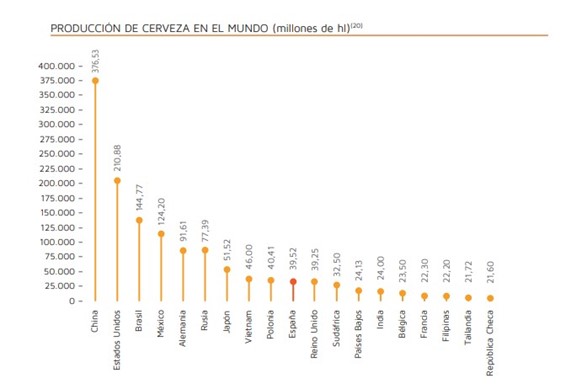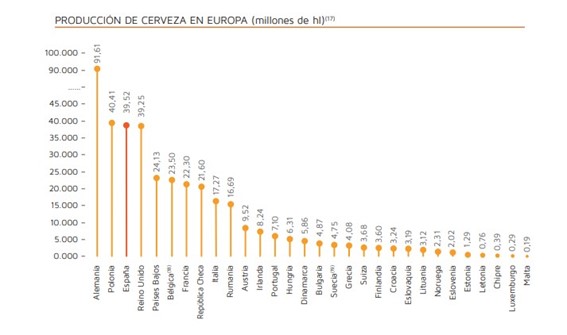For several years now, with 489 million hectoliters, China has established itself as the world’s largest beer producer. Last year it reached 376.53 million hectoliters, followed by the USA with almost half of the beer produced, which accentuates the production gap between the two countries. This is the result of the socioeconomic report on the beer sector prepared by the Spanish Brewers Association for the past year.
Until 2002, the United States brewed more beer than any other country, but the rapid growth of the industry in China has pushed it into second place. Last year, the North American country produced 210.99 million hectoliters.
Brazil is the third largest beer producer in the world with 144.77 million hectoliters of beer, confirming that the country is the largest beer producer in South America, followed by Mexico with 124.20 million hectoliters.
Focusing on Europe, Spain is the third largest producer of beer in the European Union with 39.52 million hectoliters in 2020. The sector’s challenge is to “reach Poland’s figures”, ranked second with 40.41 million hectoliters produced. Germany remains the undisputed leader with 91.61 million hectoliters.
Beer production in Spain was equally hard hit last 2020: breweries produced 12% less beer, remaining at 34.7 million hectoliters, compared to 37.6 million hectoliters in 2017, 3.2% more than in 2016. The restrictions and measures taken to deal with the COVID-19 pandemic also led to an unprecedented drop in beer consumption in Spain, altering the historical series that had been positive until then. For the first time since the industry has been on record, overall consumption fell by double digits, down 12% from the previous year to 36 million hectoliters4 in 2020.
One of the challenges facing the Spanish sector is to match Poland’s figures. Jacobo Olalla Marañón, general manager of Cerveceros de España points out that “from the association we have been committed to small breweries, which needed information and support to assume the new situation, we have helped to boost exports (the only positive data of a year that unfortunately some smaller breweries could not overcome), promoting training by organizing webinars on issues that were of most concern in times of greater uncertainty. Cerveceros de España has brought together the entire value chain of the brewing sector, from the field to distribution to the on-trade, to compete for Next Generation funds. In short, the Spanish brewing sector will continue to work towards economic and social recovery”.
According to Fedishoreca, the entity that represents the main hotel and catering distribution companies, a large number of these establishments remained closed mainly for financial or profitability reasons, even when health measures allowed it.
However, the sector has a pending issue. For the General Manager of Cerveceros de España. “If there is one thing we have learned after a devastating year, it is the need for public-private collaboration. With determination, we remind the authorities of the need to broaden the sectors benefiting from the plan of extraordinary measures to support business solvency in response to the pandemic and we appreciate the fact that it has been made possible for beer-producing companies to have access to them (although, at the close of this report, not in all the autonomous communities), especially the smaller ones,” he adds.
In 2020, Spanish breweries marketed 33.3 million hectoliters of beer, a 12% decrease compared to the volume marketed in 2019 (37.8 million) and breaking the upward trend recorded by the sector before the health crisis. Beer production in Spain was also severely affected in 2020: breweries produced 12% less beer, down to 34.7 million hectoliters.
Portugal consolidated its position as the main destination for Spanish beer in 2020, and the volume exported to this country grew by 42.5% compared to last year. The United Kingdom, a country with a strong brewing tradition that ranked third in 2019, moved into second place in 2020 after overtaking China. Equatorial Guinea remains in fourth place.
Imports also grew by 9.5% in 2020 to 5.3 million hectoliters, the largest increase since 2015. The main countries from which we imported were Belgium, Portugal and France.
The revenue through taxes that beer generates for the State was estimated at 6 billion euros in 2019, placing it as the third European country that collects the most through VAT tax, behind the United Kingdom and Germany, with a much larger number of inhabitants than Spain. In 2020, the amount was reduced to €4 billion, registering a decrease of 33%.



















0 Comments